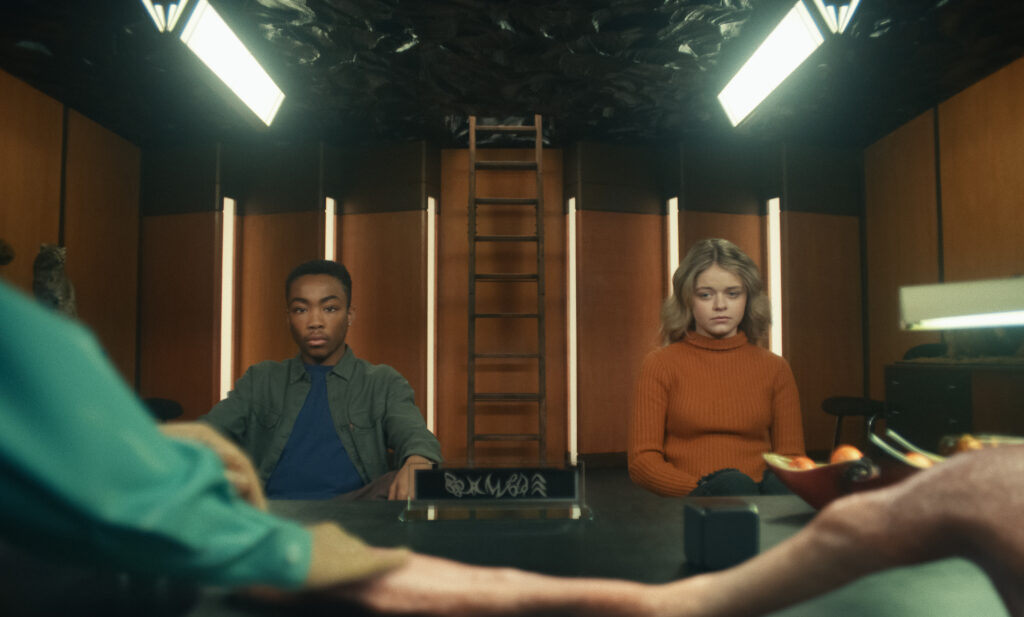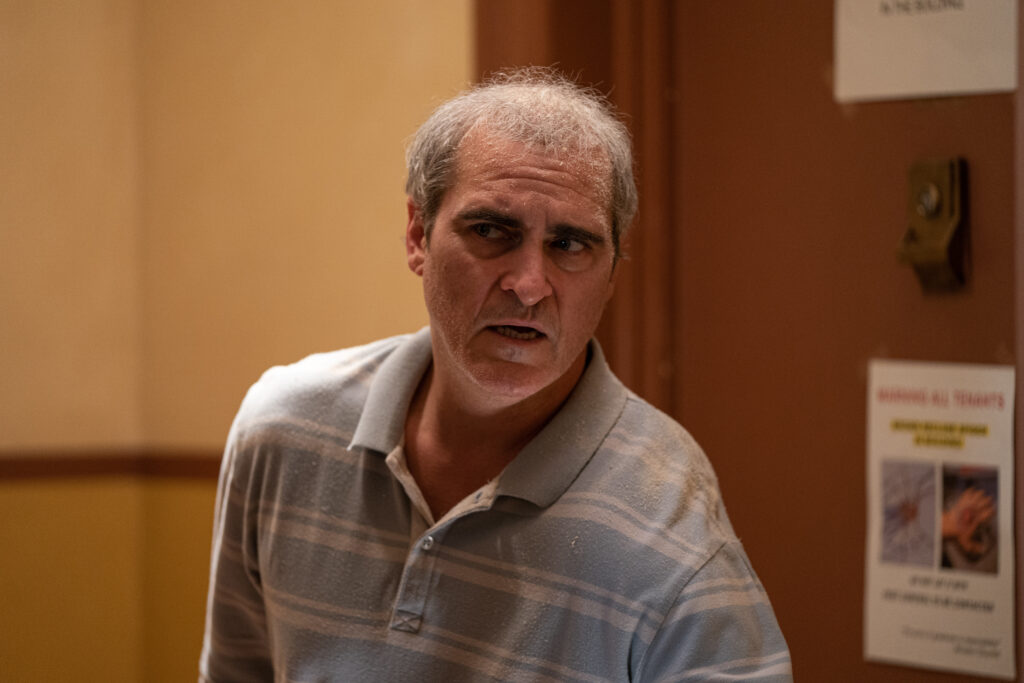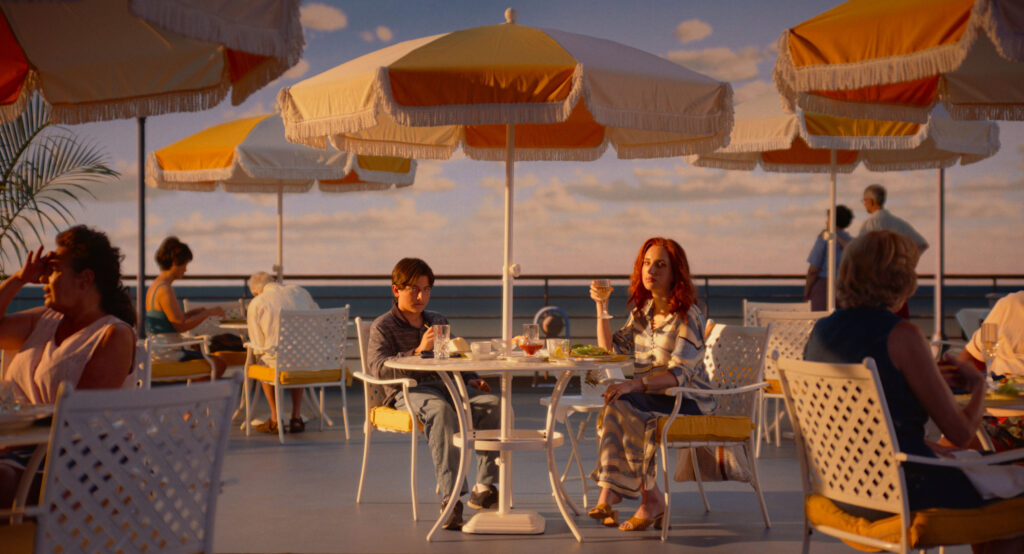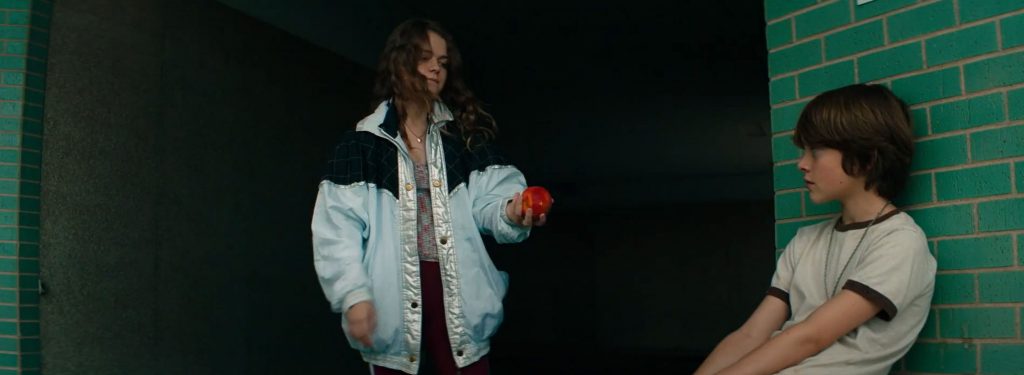August 19, 2023
by Carla Hay

“Landscape With Invisible Hand”
Directed by Cory Finley
Culture Representation: Taking place from 2036 to 2037, in an unnamed U.S. city, the sci-fi film “Landscape With Invisible Hand” (based on the 2017 book of the same name) features an African American and white cast of characters (with a few Latinos and Asians) representing the working-class and middle-class.
Culture Clash: After an alien invasion leaves most people on Earth destitute and desperate for money, a teenage aspiring painter artist agrees to fake a romance with a classmate, in order to be paid to livestream their relationship, but problems occur when the teens are sued by an alien for fraud.
Culture Audience: “Landscape With Invisible Hand” will appeal primarily to people who are fans of the book on which the movie is based, as well as movies that have commentary about social inequalities and cashing in on voyeurism.

“Landscape With Invisible Hand” is a mixed bag of quirky science fiction that sometimes gets boring and repetitive. However, the story is presented in a memorable cinematic way, and the performances do justice to the source material. “Landscape With Invisible Hand” had its world premiere at the 2023 Sundance Film Festival. The movie’s title is explained in the movie’s last scene.
Written and directed by Cory Finley, “Landscape With Invisible Hand” is based on M.T. Anderson’s 2017 novel of the same name. It’s a movie with a low-key satirical tone that might not be appreciated by anyone expecting more comedic material. There’s some pointed commentary (in a “show, don’t tell” way) about colonialism, social class prejudices and the role that technology plays in people making money off of their private lives. Some of the commentary is right on target, while other commentary is a little too tame and should have been more impactful.
“Landscape With Invisible Hand” (which takes place in an unnamed U.S. city from the years 2036 to 2037) is told primarily from the perspective of 17-year-old introvert Adam Campbell (played by Asante Blackk), a very talented painter artist who wants to do his art for a living. In this story, Earth has been taken over by outer-space aliens called Vuvv, which have tentacles on their heads and have hands that look like oar paddles. When the Vuvv creatures talk, they rub their hands together, which makes a sound similar to sandpaper being rubbed together. The Vuvv creatures can speak human languages, but they do not have human emotions and are fascinated by anything that shows human emotions.
The Vuvv invasion of Earth has left almost everyone on Earth desolate and desperate for money, because the Vuvv creatures want humans to be at their financial mercy. People aren’t wandering around looking dirty and starving and dressed in raggedy clothing. The desperation is more subtle: People in this area have enough to eat and drink, and institutions (schools, hospitals, etc.) are still running smoothly, but the cost of basic living has become increasingly too much for most of the population.
There’s a constantly hovering Vuvv “mothership” in the sky where some people have chosen to live, in order get “elite” and “special” treatment from the Vuvv creatures. But choosing to live on this enormous spaceship means that the selected humans often have to leave loved ones behind on Earth. There are signs of the apocalypse everywhere, including areas that look they were hit by a bomb. At one point in the movie, Adam tells a new classmate who becomes his love interest that he had a chance to live in this mothership, but he chose not to go.
Adam lives in a middle-class but increasingly run-down house with his mother Beth Campbell (played by Tiffany Haddish), a lawyer who can’t find work as a lawyer and has been struggling to pay the bills with the low-paying job she currently has. In this post-apocalyptic society, Beth is considered very lucky to have a job and a home, since many people on Earth are currently unemployed and have lost or are close to losing their homes. Adam’s quiet younger sister Natalie (played Brooklynn MacKinzie), who’s about 12 or 13 years old, also lives in the household.
Beth’s husband (played by William Jackson Harper), a real estate developer who doesn’t have a first name in the movie, left the family to find better job opportunities on the West Coast. Mr. Campbell eventually stopped keeping in touch with his wife and kids, who have all assumed that he abandoned them. They have no idea where he currently lives.
The main thing that gives Adam comfort during this bleak existence is his passion for painting. He usually paints portraits and landscapes on various surfaces. Throughout the movie, several paintings are shown (most of them are Adam’s paintings) which describe the title of the painting, the type of paint used, the type of surface and the year that the painting was completed. Natalie’s source of comfort is tending to a garden in the family’s empty backyard pool. Natalie is a very underdeveloped and forgettable character in this movie.
At school, Adam has a homeroom teacher named Mr. Stanley (played by John Newberg), who announces to the class that he is going to be replaced by an artificial intelligence hologram. Almost everyone on the teaching staff will be laid off for the same reason—all because the Vuvv creatures want it that way. It’s another example of how the Vuvv creatures abuse their power.
During an art class, Adam meets a new student during her first day at this school. Her name is Chloe Marsh (played by Kylie Rogers), who is smart but very jaded. Chloe is about the same age as Adam. She doesn’t take the art class seriously at all—when the class is asked to draw a portrait of a fellow student, she draws a giant penis instead—but Chloe and Adam have an instant rapport. She compliments Adam on his artistic talent. Adam is immediately attracted to her in a romantic way.
Chloe’s first day at school is jolted by a tragedy. While she, Adam and several people are outside in the front of the school, they see Mr. Stanley walk outside and shoot himself. The suicide is talked about later, but in a way implying that human suicides have become so common in this Vuvv-controlled world, suicide is not as shocking as it was before the Vuvv takeover of Earth.
Chloe tells Adam that she and her widowed and disillusioned father Mr. Marsh (played by Josh Hamilton) and angry older brother Hunter Marsh (played by Michael Gandolfini), who’s in his late teens, are temporarily homeless. Adam is eager to impress Chloe, so he invites the Marsh family to stay in the basement of his family’s house. At first, Beth thinks the Marsh family will only be staying for a few days. But then, over dinner in the family home, Adam tells Beth that he invited the Marsh family to stay as long as they need.
This news does not go down well with Beth, but she has enough compassion to not kick the Marsh family out of the house. Mr. Marsh is unemployed, but he promises Beth that he will start paying her rent when he finds a job. Meanwhile, Adam’s attraction to Chloe begins to grow. He is so infactuated with her, he paints a portrait of her and gives it to Chloe as a gift. She is very flattered, and there are indications she’s starting to be romantically attracted to Adam too.
One of the quirks about this new existence after the Vuvv invasion is that humans on Earth now have new types of food to consume. This food is usually jelly-like versions of solid foods that humans used to enjoy before the invasion. Solid foods in their original forms are considered luxurious delicacies. Hunter often whines and complains about the food that he has to eat.
Chloe eventually gets the idea to make money by getting involved in a livestreaming program called Courtship Broadcast, where people agree to livestream their love lives for the amusement of the Vuvv creatures. Courtship Broadcast works much like today’s social media: The more followers/subscribers someone has, the more potential there is to make money. People who livestream on Courtship Broadcast put detachable nodes on their foreheads to activate the livestream. When they want to interrupt or stop the livestream, they can remove the nodes from their foreheads.
Chloe convinces Adam to join Courtship Broadcast so that they can pretend to date each other and make money from it, in order to financially help their families. Adam reluctantly agrees. He instinctively knows that things could go wrong in faking this relationship. Chloe and Adam tell their families about the plan to fabricate a romance for Courtship Broadcast money.
But after a while, it starts to bother Adam that all the romantic talk and actions that Chloe is showing for Courtship Broadcast aren’t genuine, because she’s only doing it for the money. Adam wants their romance to be real. Chloe has genuine affectionate feelings for Adam, but the movie makes it look like he’s in love with her and wants a serious relationship, while she just likes him a lot and wants a “friend with benefits” situation.
Eventually, one of the Vuvv creatures named Vuvv Shirley—who is watching Adam and Chloe’s “romance” and is a Courtship Broadcast subscriber—figures out that Adam and Chloe are faking it. Chole and Adam are summoned to Vuvv Shirley’s office, where she informs the two teens that she’s suing them for fraud for “millions” in money—enough for the Campbell and Marsh families to be “in debt for six generations.”
Vuvv Shirley offers a solution that involves some bizarre role-playing scenarios where a Vuvv arrrives to live in the Campbell household. Without giving away too much information, these scenarios require Beth to be passive and subservient to this Vuvv creature. And the reaction from outspoken and independent Beth is exactly what you think it is.
Meanwhile, there are some other power dynamics at play that cause tensions in the household. Even though Beth has generously given the Marsh family a place to live (and eventually, Mr. Marsh starts paying rent), Mr. Marsh and Hunter act entitled and privileged toward Beth. A big argument erupts when Mr. Marsh and Hunter use Beth’s computer without her permission and insult her when she politely tells them to next time ask permission to use any of her things.
There’s an unspoken racial subtext to the hostility that Mr. Marsh and Hunter express toward Beth, but the movie seems afraid to fully acknowledge why there is this resentment. Mr. Marsh tells Beth that he’s not used to being in this situation of being financially poor and living in someone else’s house. What he doesn’t say out loud is that it also makes him uncomfortable to be living in a house with a house where a black woman has more money and power than he does.
Mr. Marsh also shows subtle but noticeable racial discomfort over Adam and Chloe kissing, even if it’s for the Courtship Broadcast. Mr. Marsh seems afraid of Chloe developing real romantic feelings for Adam, who is obviously starting to fall in love with Chloe. Mr. Marsh even describes Adam as a “loser,” even though Adam has never shown any indication that he’s a bad person or is forcing Chloe to do anything that she doesn’t want to do. (Remember, it was her idea to fake the romance for money.)
“Landscape With Invisible Hand” seems to want to say a lot about the lengths that certain people will go to make money and what that might do to someone’s pride, ego or dignity. Some of the scenarios get a little tedious. It’s constantly shown that the Vuvv creatures are manipulative control freaks, but whatever mayhem and disruption they’re causing, it doesn’t seem to be doing the Vuvv much good either. Who wants to be in charge of a planet that’s in disarray caused by the very entities that invaded the planet?
There’s a scene where Chloe and Adam are driven by golf cart to an abandoned golf course. The driver (played by Vishwas) tells the two teens that he used to be a surgeon, but he gets much more money from the Vuvv creatures to be a human driver, which is considered a “status symbol” instead of having a hologram driver. Aside from showing that the Vuvvs use humans as pawns for the Vuvvs’ amusement, this anecdote doesn’t serve much a purpose in the story.
What isn’t explained in “Landscape With Invisible Hand” is why the billions of people on Earth seem to have given up on trying to get back control of their lives from the Vuvv. There are never any references to what Earth’s leaders or even leaders of the United States have done about this alien takeover. Adam’s painting talent leads to pivotal part of the movie, but the conclusion of that part of the storyline kind of falls flat.
What makes the movie interesting are the lead performances by Blackk and Rogers, who adeptly convey that despite all the upheaval in the lives of Adam and Chloe, they still want to live their lives in the way that teenagers usually did before this Vuvv invasion. It’s not quite a rebellion against the Vuvv, but it’s a way for Adam and Chloe to forge their own paths and their own identities when they are brink of adulthood. In a world where the Vuvvs are trying to control people though money, the one thing that the Vuvvs can’t control are human emotions.
“Landscape With Invisible Hand” is not the type of movie where the teens have a breakthrough friendship bond with a mysterious alien. It’s also not a post-apocalyptic movie where people are living like feral animals. It’s a movie that gets viewers to think about personal values and staying true to oneself when it might be easier or financially rewarding to be fake about it all.
Metro Goldwyn Mayer Pictures released “Landscape With Invisible Hand” in select U.S. cinemas on August 18, 2023.




